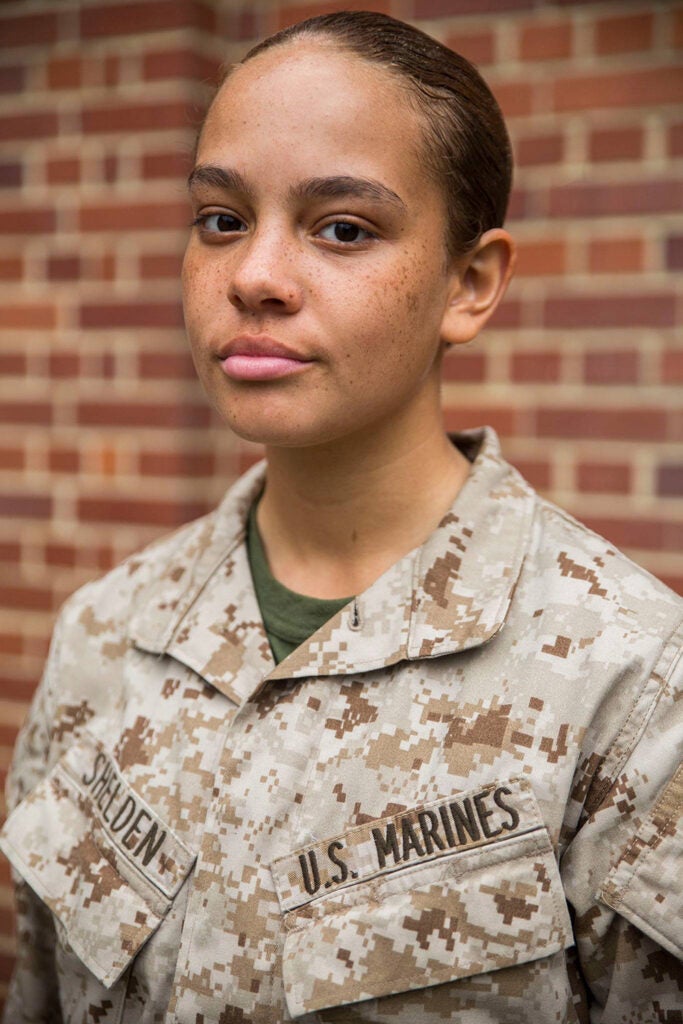A Marine’s journey to the Farm
An “art nerd” with her sights set on college, Hayden Shelden chose military service as the path to get there, and it changed her in ways she never imagined.
Hayden Shelden always knew she wanted to go to college and medical school, and that military service would be her route to get there.

Hayden Shelden recently joined Stanford after serving in the U.S. Marine Corps. (Image credit: Andrew Brodhead)
She had her heart set on joining the U.S. Air Force after high school. But during the application process, she was diagnosed with Raynaud’s disorder, a circulatory condition that makes her prone to hypothermia, and was immediately disqualified. She was devastated.
“One day I was crying in a fetal position on the floor and my stepdad, who was in the Marines, said, ‘Well, let’s go to the Marine Corps recruiter,’ ” she recalled.
But Shelden had reservations. She wasn’t sure she was cut out for the Marines, which she felt represented the antithesis of everything she thought she was. As a teen, Shelden was studious, played golf, and enjoyed painting, photography, and dance. She also loved theater and performing in musicals.
“If you knew me in high school, you would have never guessed that I would join the Marine Corps because I was kind of an art nerd,” she said. “I thought my ‘free spirit’ disqualified me.”
But Shelden applied and was accepted. A few weeks later she left her hometown in Kansas and headed to boot camp, which she said was the beginning of a transformative experience. “It definitely turned me into something very different from who I thought I was,” she said, adding that the Marines took her from a fixed mindset to a growth mindset. “I was unaware of just how capable I was at learning new things until I joined.”
Boot camp
In 2015 Shelden relocated to Parris Island, South Carolina, to begin a three-month boot camp. She arrived with nothing but the clothes she was wearing, a photo ID, and her birth certificate, nervous about the “breakdown” process that she was walking into.

Hayden Shelden’s time in the Marines was a transformative experience. (Image credit: Jennifer Schubert)
“When you get there, everybody’s yelling at you, you’re confused, and you make a lot of mistakes,” she recalled. “But as time goes on, your brain and body adapt, and you learn to perform tasks faster and prioritize better.”
She and the other recruits learned how to put on a uniform, march in formation, and carry and shoot a weapon. They conducted drills, engaged in various physical trainings, and learned battle tactics. The experience, she said, immediately overtook her.
“I could feel the transformation happening,” she said. “Over time, they were building us back up into Marines.”
After completing boot camp, Shelden, who had chosen language as her occupational specialty, was sent to Monterey, California, to attend the Defense Language Institute (DLI).
For the next year and a half, she was immersed in intense, full-time language training that was taught almost exclusively in Russian, an instructional style she calls the “fire hose” effect because trainees get “hosed down by a wave of new information.”
While at DLI, she was sent to Latvia for a month for another language course. It was her first time outside of the United States, and while there, she lived with a host family that spoke only Russian. She said the experience forced her out of her comfort zone, and it was also when she realized she’d become fluent.
Deploying overseas
In 2017, Shelden deployed to Romania with the Black Sea Rotational Force, which conducted joint military engagements with Russian-speaking partner nations in Eastern Europe. For nine months she served as a Russian translator and cultural expert on a team that worked with representatives of other nations to teach military tactics.
Throughout her time in the military, Shelden took courses to fulfill various college admissions requirements and planned for her eventual enrollment in college.
Shelden completed her service in 2020, after a six-month deployment in Afghanistan. She returned home to Kansas, where she intended to pursue college and medical school. But, deciding that she didn’t want to attend school remotely during the COVID-19 pandemic, she opted instead for a job.
Shooting for the stars
Shelden said that taking risks and pushing herself to do things she never imagined she could do, like learning Russian, or occupying spaces she didn’t initially think she belonged, like the Marines, boosted her confidence when it came time to apply to college. Encouraged by a fellow Marine, she applied to Stanford. When she found out she had been accepted, she says, she cried tears of joy and relief.
“Part of me didn’t think it was possible for me to do this,” she said. “But shooting for the stars and putting myself out there and then it actually happening for me was a gratifying experience.”
In September, she packed her car and drove from her family’s home in Kansas to Palo Alto. The trip ended at Palm Drive, where she had her first sight of the Stanford campus. “It looked like a scene from a movie,” she said. “It was surreal.”
Shelden is interested in psychology and the brain and intends to pursue medical school. She’s also a member of the Stanford Pre-Medical Association and is considering some psychiatry and military-associated Intro Sems courses. She said that while she’s enjoying her classes and being a student, she’s still reacclimating to civilian life.
“There’s a lot more freedom in the civilian world, so embracing that has definitely been a journey,” she said. “I’m using this time to figure out who I am outside of the military and shed those parts of my identity that I had to adopt to be a Marine. I’m still on that path right now, but hopeful that Stanford will help me get there.”